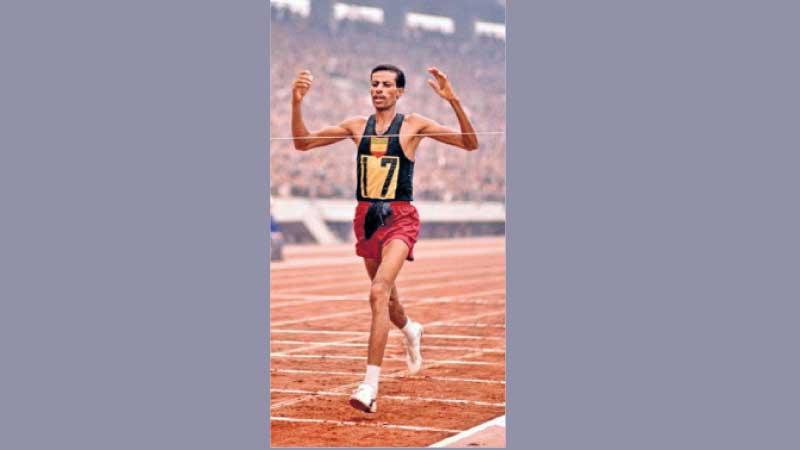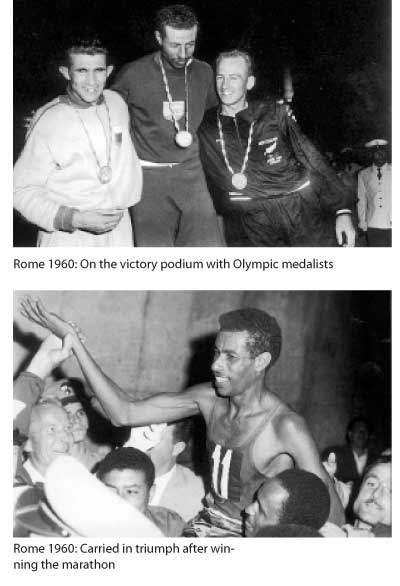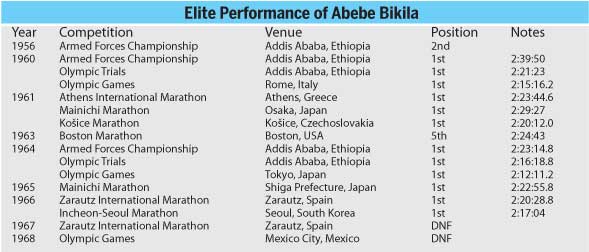
The Story of Captain Abebe Bikila: National Hero, World’s Greatest Marathon Athlete and Olympic Champion of 1960 and 1964:
The highest possible accolade for an athlete is induction into the International Association of Athletics Federations’ Hall of Fame. It is the crowning glory of an athlete’s career and honours the lifetime achievements of the greatest athletes. The Barefoot Marathon Icon, Shambel Abebe Bikila’s name appears on the top of the list in recognition of his unique achievements.
Abebe Bikila’s famous quote, “I wanted the world to know that my country Ethiopia has always won with determination and heroism,” reflects his valour as a soldier in the elite Infantry Regiment of the Imperial Guard and his commitment to become Ethiopia’s foremost athlete and the world’s greatest marathon runner. He was the first athlete to win the Summer Olympic marathon back-to-back in Rome 1960 and Tokyo 1964.
Rome 1960 Olympic Games
 The event was held on September 10, 1960 with 69 athletes from 35 nations. It was the first marathon to neither start nor end at the Olympic Stadium. Abebe Bikila, finished in a world record time of 2:15:16.2. All medalists came from nations, which had never won an Olympic marathon medal – Ethiopia, Morocco and New Zealand. Sri Lanka’s Linus Diaz became the first to take part in an Olympic marathon and was 39th with a time of 2:32:12.0.
The event was held on September 10, 1960 with 69 athletes from 35 nations. It was the first marathon to neither start nor end at the Olympic Stadium. Abebe Bikila, finished in a world record time of 2:15:16.2. All medalists came from nations, which had never won an Olympic marathon medal – Ethiopia, Morocco and New Zealand. Sri Lanka’s Linus Diaz became the first to take part in an Olympic marathon and was 39th with a time of 2:32:12.0.
Tokyo 1964 Olympic Games
The marathon was held on October 21, 1964 with 79 athletes from 41 nations. Bikila was favoured to repeat. The event was won by Abebe Bikila, setting a new world record at 2:12:11.2. Great Britain and Japan took silver and bronze. The first man to successfully defend the Olympic marathon and indeed, the first to win two medals of any colour in Olympic marathons. Unlike in 1960, he wore shoes this time. Sri Lanka’s marathoner Ranatunge Karunananda did not start.
Abebe moved to Addis Ababa around 1952 and joined the 5th Infantry Regiment of the Ethiopian Imperial Guard, an elite infantry division that safeguarded the Emperor of Ethiopia. Enlisting as a soldier, he rose to the rank of a Captain. He won his first Olympic gold medal at Rome 1960, running barefoot. His Personal Best for marathon was 2:12:11.2 achieved at the Tokyo 1964 Olympic Games.
Abebe participated in a total of sixteen marathons. He was placed second in his first marathon in Addis Ababa, won twelve and finished fifth in the 1963 Boston Marathon. In July 1967, he sustained the first of several sports-related leg injuries that prevented him from finishing his last two marathons. Abebe was a pioneer in long-distance running. He is the subject of biographies and films and he is often featured in publications about the marathon and the Olympics.
On March 22, 1969, Abebe was paralyzed due to a car accident. He regained some upper-body mobility, but he never walked again. While he was receiving medical treatment in England, Abebe competed in archery and table tennis at the 1970 Stoke Mandeville Games in London. Those Games were an early precursor of the Paralympic Games. He competed in both sports at a 1971 competition for the disabled in Norway and won its cross-country sleigh-riding event.
Birth, growth, marriage and maiden Olympics
Abebe Bikila was born on August 7, 1932, in the small community of Jato, then part of the Selale District of Shewa. His birthday coincided with the Los Angeles 1932 Marathon. Abebe was the son of Wudinesh Beneberu and Bikila Demissie. During the Second Italo-Ethiopian War (1935-1937), his family was forced to move to the remote town of Gorro. The family eventually moved back to Jato, where they had a farm.
As a young boy, Abebe played gena, a traditional long-distance hockey game played with goalposts sometimes kilometers apart. During the mid-1950s, Abebe ran 20 kms from the hills of Sululta to Addis Ababa and back every day. Onni Niskanen, a Swedish coach employed to train the Imperial Guard, soon noticed him and began training him for the marathon.
In 1956, Abebe finished second in his first marathon at the Ethiopian Armed Forces Championship. According to biographer Tim Judah, his entry in the Olympics was a “long planned operation.” Abebe was 27 when his mother arranged his marriage to 15-year Yewebdar Wolde-Giorgis on March 16, 1960 and they lived happily. In July 1960, Abebe won his first marathon in Addis Ababa.
A month later, he won again in Addis Ababa with a time of 2:21:23, which was faster than the then Olympic record held by Emil Zatopek. Both Abebe Bikila and Abebe Wakgira were entered for the marathon at the 1960 Rome Olympics. In Rome, Abebe purchased new running shoes, but they did not fit well and gave him blisters. He consequently decided to run barefoot.
Due to Rome’s burning heat, the race started in late-afternoon at the foot of the Capitoline Hill staircase and finished at night at the Arch of Constantine, just outside the Colosseum. The course passed Piazza di Campidoglio, many wonders of Ancient Roma, Caracalla Baths and the Appian Way.
By about 25 kms, Abebe and Ben Abdesselam moved away from the rest of the pack. Trailing by about two minutes at the 30 kms mark were New Zealand’s Barry Magee and Sergei Popov, the world marathon record holder. Abebe and Ben Abdesselam remained together until the last 500. Then, Abebe sprinted to the finish. In the early-evening darkness, his path along the Appian Way was lined with Italian soldiers holding torches. Immediately after crossing the finish line Abebe began to touch his toes and run in place, and later said that he could have run another 10 to 15 km.
Soldier turned marathon athlete and 1964 Olympics
Abebe returned to his homeland a hero and was greeted by a large crowd, many dignitaries and the Commander of the Imperial Guard. Abebe was paraded through the streets of Addis Ababa along a procession route lined with thousands of people and presented to Emperor Haile Selassie. The emperor awarded him the Star of Ethiopia and promoted him a Corporal. He was presented a chauffeur-driven Volkswagen Beetle and a home, both owned by the Guard.
In the 1961 Athens Classical Marathon, Abebe again won while running barefoot. This was the second and the last event in which he competed barefooted. The same year he won the marathons in Osaka and Kosice. Abebe ran the 1963 Boston Marathon, which was between his Olympic wins in 1960 and 1964 and finished fifth in 2:24:43. This was the only time in his competitive career that he completed an international marathon without winning.
 He and fellow citizen Mamo Wolde, who finished 12th, had run together on record pace for 18 miles, until cold winds and the hills in Newton caused both to fall back. The race was won by Belgium’s Aurele Vandendriessche in a course record 2:18:58. Abebe returned to Ethiopia and did not compete in another marathon until 1964 in Addis Ababa. He won that race in a time of 2:23:14.8.
He and fellow citizen Mamo Wolde, who finished 12th, had run together on record pace for 18 miles, until cold winds and the hills in Newton caused both to fall back. The race was won by Belgium’s Aurele Vandendriessche in a course record 2:18:58. Abebe returned to Ethiopia and did not compete in another marathon until 1964 in Addis Ababa. He won that race in a time of 2:23:14.8.
Forty days before the 1964 Summer Olympics in Tokyo, Abebe began to feel pain while training in Debre Zeit. He was brought to the hospital and diagnosed with acute appendicitis, and had an appendectomy on September 16. Back on his feet in a few days, Abebe left the hospital within a week. He entered the marathon wearing Puma shoes. This was in contrast to the previous Olympics in Rome, where he ran barefoot.
A total 79 athletes from 41 nations entered, with 68 starting and 58 finishing. Abebe began the race right behind the lead pack until about the 10 km mark, when he slowly increased his pace. At 15 km, he was in third place behind Ron Clarke of Australia and Jim Hogan of Ireland. Shortly before 20 km, Abebe took the lead. By 35 km, Abebe was almost two-and-a-half minutes in front of Hogan and Kokichi Tsuburaya of Japan. Hogan soon dropped out, exhausted, leaving only Tsuburaya three minutes behind Abebe by the 40 km mark.
Abebe entered the Olympic stadium alone, to the cheers of 75,000 spectators. The crowd had been listening on the radio and anticipated his triumphant entrance. The event was won by Abebe. Unlike in 1960, Abebe finished with a time of 2:12:11.2, four minutes ahead of silver medalist Basil Heatley of Great Britain and bronze medalist Kokichi Tsuburaya of Japan.
Abebe did not appear exhausted after the finish, and he again performed a routine of calisthenics, which included touching “his toes twice then lying down on his back, cycling his legs in the air.” For the second time, Abebe received Ethiopia’s only gold medal and returned home to a hero’s welcome. The emperor promoted him to the rank of Lieutenant. Abebe received the Order of Menelik II, a Volkswagen Beetle and a house.
Honour, struggle, accident and death
On April 21, 1965, as part of the opening ceremonies for the second season of the 1964 - 1965 New York World’s Fair, Abebe and fellow athlete and Imperial Guardsman Mamo Wolde, ran a ceremonial half-marathon at the fair. They carried a parchment scroll with greetings from Haile Selassie. The following month, Abebe returned to Japan and won his second Mainichi Marathon.
In 1966, he won both the Zarautz Marathon and Inchon Marathon. In 1967, Abebe could not finish the Zarautz Marathon. He had injured his hamstring, an injury from which he would never recover. Abebe had begun to limp, and the 1966 Incheon Marathon was the last he completed as the winner.
In July 1968, he travelled to Germany for treatment of “circulatory ailments” in his legs. The German government honoured him by not accepting payments for the medical services.
Abebe returned in time to join the rest of the Ethiopian Olympic team training in Asmara, which has an altitude (2,200 m) and climate similar to Mexico City. Seeking a third consecutive gold medal, Abebe entered the October 20, 1968 Olympic marathon. Symbolically, he was issued Bib No. 1. A week before the race, he developed pain in his left leg. Doctors discovered a fracture in his fibula, and he was advised to stay off his feet until the day of the race. Abebe had to drop out of the race after 16 kms. This was Abebe’s last marathon appearance. However, he was rewarded with a promotion to the rank of Captain upon his return to Ethiopia.
On the night of March 22, 1969, Abebe lost control of his Volkswagen Beetle and it overturned, trapping him inside. His biographer Tim Judah quotes Abebe’s account of the accident from the biography by his daughter, Tsige, that he tried “to avoid a fast, oncoming car.” Judah wrote that it was difficult to know for certain what happened. Abebe was freed from his car the following morning and brought to the Imperial Guard hospital. The accident left him a quadriplegic, paralyzed from the neck down; he never walked again.
On March 29, Abebe was transferred to Stoke Mandeville Hospital in England, where he spent eight months receiving treatment. He was visited by Queen Elizabeth II and received get-well cards from all over the world. Although Abebe could not move his head at first, his condition eventually improved to paraplegia, regaining the use of his arms.
In 1970, Abebe began training for wheelchair-athlete archery competitions. In July 1970, he competed in archery and table tennis at the Stoke Mandeville Wheelchair Games in London. In April, 1971, Abebe participated in games for the disabled in Norway. Although he had been invited as a guest, he competed in archery and table tennis.
 Abebe was invited to the Munich 1972 Summer Olympics as a special guest, and received a standing ovation during the opening ceremony. On October 25, 1973, Abebe died in Addis Ababa at age 41 of a cerebral hemorrhage, a complication related to his accident four years earlier. He was buried with full military honours. His state funeral was attended by an estimated 65,000 people including Emperor Haile Selassie, who proclaimed a day of mourning for the country’s national hero. Abebe is interred in a tomb with a bronze statue at St. Joseph’s Church in Addis Ababa.
Abebe was invited to the Munich 1972 Summer Olympics as a special guest, and received a standing ovation during the opening ceremony. On October 25, 1973, Abebe died in Addis Ababa at age 41 of a cerebral hemorrhage, a complication related to his accident four years earlier. He was buried with full military honours. His state funeral was attended by an estimated 65,000 people including Emperor Haile Selassie, who proclaimed a day of mourning for the country’s national hero. Abebe is interred in a tomb with a bronze statue at St. Joseph’s Church in Addis Ababa.
Legacy as a National Hero
Abebe began, and largely inspired, East African preeminence in long-distance running. According to Kenny Moore, a contemporary athlete and writer for Sports Illustrated, he began “the great African distance running avalanche.” Abebe brought to the forefront the now-accepted relationship between endurance and high-altitude training in all kinds of sports. Five years after his death, the New York Road Runners inaugurated the Annual Abebe Bikila Award for contributions by an individual to long-distance running.
He is a national hero in Ethiopia, and a stadium in Addis Ababa is named in his honour. In late 1972, the American Community School of Addis Ababa dedicated its gymnasium to Abebe. On March 21, 2010, the Rome Marathon observed the 50th anniversary of his Olympic victory. The winner, Ethiopian runner Siraj Gena, ran the last 300m of the race barefoot. A plaque commemorating the anniversary is mounted on a wall on the Via di San Gregorio, and a footbridge in Ladispoli was named in Abebe’s honour.
According to Abebe’s New York Times obituary, Abebe and Yewebdar had three sons, along with their daughter Tsige. It came to light in December 2019 that the family received his Olympic ring that he lost at the Tokyo Olympic stadium. Abebe left his winning ring in a bathroom after the Olympic medal ceremony. A woman who was working took it home, but later regretted and her son was waiting for an opportunity to return it. He gave the ring to Yetnayet, son of the late Abebe, when he came to Kasama City in Japan as a guest of honor for the half marathon competition conducted in honour of his father.
Abebe has been featured in several documentaries about his life and the Olympics.
His victory at the Tokyo 1964 Olympics was featured in the 1965 documentary, “Tokyo Olympiad” directed by Kon Ichikawa. Footage from that film was recycled in the 1976 thriller, “Marathon Man” directed by John Schlesinger. Abebe was the subject of Bud Greenspan’s 1972 documentary, “The Ethiopians.” The documentary was incorporated into “The Marathon,” a 1976 episode of Greenspan’s “The Olympiad” television documentary series. “The Marathon,” which chronicles Abebe’s two Olympic victories, ends with a dedication ceremony in Abebe’s honour.
In 1992, Yamada Kazuhiro published the first full biography about Abebe, written in Japanese and published in Tokyo; it was entitled “Do you remember Abebe?” Since then, there have been at least three biographical works based on his life. Among these is “Triumph and Tragedy,” written in English by his daughter Tsige and published in Addis Ababa in 1996. The other two written in English, are Paul Rambali’s 2007 fictional biographical novel “Barefoot Runner” and Tim Judah’s 2009 edition “Bikila: Ethiopia’s Barefoot Olympian.”
Abebe is also the subject of a 2009 feature film, “The Athlete,” directed by Davey Frankel and Rasselas Lakew. The film starring Rasselas focuses on the final years of Abebe’s life: his quest to regain the Olympic title, the accident and his struggle to compete again.
(The author’s research interests encompasses Olympism and Sports; he is a recipient of National and Presidential Accolades for Academic and Sports pursuits. He possesses a PhD, MPhil and double MSc)
